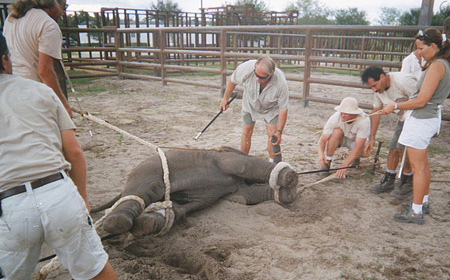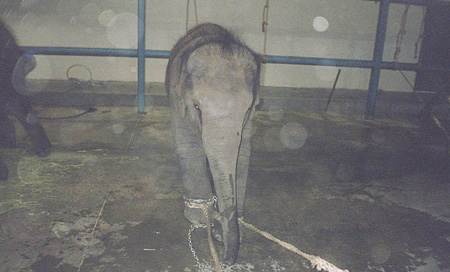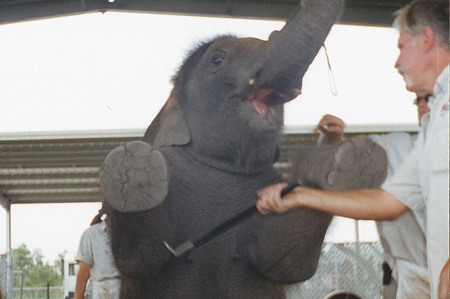In medieval prisons, inmates were punished with a device called a "cat-o'-nine-tails" -- a whip made of nine knotted thongs of cord designed to lacerate the skin and cause intense pain. Reforms have rightfully eliminated such cruelty to human prisoners, but for animals in the Ringling Bros. and Barnum & Bailey Circus, corporal punishment, even for baby pachyderms, is still routine. While the circus was at Madison Square Garden and other venues last year a PETA investigator caught Ringling employees hitting elephants with sharp metal bullhooks (a fireplace poker-like object that handlers use to dig into the sensitive areas behind an elephant's ears or knees, or under her arm, to make her obey).

The abuse is traditional, entrenched and begins when elephants are only months old. Photographs of Ringling's violent training sessions taken by an elephant trainer long employed by the circus shows crying baby elephants tied down with ropes by all four legs and forced to the ground by men wielding bullhooks and electric prods.
This 2009 information adds to the large body of evidence demonstrating ill-treatment of elephants to the point of death, with Ringling causing the deaths of at least three calves. An 8-month-old elephant was destroyed after he fractured his hind legs falling off a pedestal during a training exercise. Another baby, who had been pulled from his mother, trained, and put on the road, drowned in a pond as he attempted to get away from a trainer chasing and prodding him with a bullhook. A 3-year-old elephant died when he became very sick shortly after he was put on the road and was shoved back into the ring for three shows. And just recently, a 1-year-old elephant who was pulled off the road after just one month of travel and performances is now fighting the stress-related and very deadly herpes virus.

In their natural homes, elephants are highly social beings who share intense and complicated family relationships. Mothers teach babies life skills like how to use dust as sunscreen and to ward off insect bites, aunts babysit, and grandmothers mediate squabbles. Births are joyous celebrations; deaths of loved ones are mourned. Daughters stay with their mothers and extended families for life and sons until their early teens. In the circus, these emotional bonds are left in tatters.
Life under the big top means "pay attention to your trainers, feel the bite of their cruel training tools in your flesh, don't stumble or falter even if you feel tired or ill, obey, obey, obey." It means leg chains between acts, the loss of all comfort and nurturing from your family and never a moment of freedom from servitude
Researchers around the world have documented the astonishing complexity of elephants and the psychological trauma most experience in captivity. Elephants are self-aware and recognize themselves in mirrors. If you wonder how these magnificent beings keep from going mad -- chained in reeking boxcars day after day, on alert for the man wielding the bullhook, performing the same meaningless tricks over and over -- the answer is, they don't. At Ringling, you can see elephants exhibiting severely neurotic behavior like constant swaying, something common to animals who are suffering from extreme stress caused by boredom, the inability to take even two steps, and the severe frustration of losing all control over your life, never having a choice in any decision whatsoever.

Sometimes elephants do snap and make a break for it, go berserk or run amok. They are often shot to death. But most simply endure. Their spirit and independence were broken when they were ripped from their mother's side and beaten into submission. Otherwise, they would all use their immense strength to rebel against the human hand of tyranny.
Ringling and other circuses have made it clear that they have no intention of stopping their abusive practices. And the law -- which provides minimal requirements for cage size and little else -- does not protect animals in circuses. It's up to each of us to say "enough is enough."
Ingrid E. Newkirk is the president and founder of People for the Ethical Treatment of Animals, 1536 16th Street NW, Washington, DC 20036; www.PETA.org. Her latest book is The PETA Practical Guide to Animal Rights.